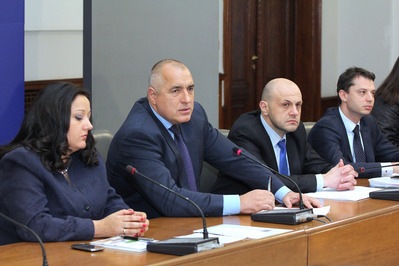Chaos in Bulgarian energy
20 February 2013
An energy crisis has triggered mass demonstrations, the resignation of the Bulgarian government and cyber attacks on electricity distributor CEZ. A long-running failure to maintain generating capacity underlies the country's problems.
Issues came to a head for the country after power bills surged on winter heating demand. The State Energy and Water Regulatory Commission (SEWRC) has oversight of the wholesale power market, including authority to set prices. It raised them by 13% in July 2012, putting many people in an unaffordable situation when winter heating bills came.
An outburst of anger at a demonstration on 17 February saw 15 people hurt on the streets of Sofia, prompting the government to demand that Juliana Ivanova resign as head of SEWRC.
Two days later the government said that the "independent" SEWRC should be able to reduce prices by 8% in coming months - thanks to "electricity produced by the Kozloduy nuclear power plant." Also on 19 February, the government said it would nationalise the distribution firms, including Czech-controlled CEZ Bulgaria.
 |
| Boyko Borisov at a cabinet meeting on 19 February |
CEZ reacted to say such a move would be a "gross violation of laws of Bulgaria as a members state of the European Union." It claimed to have fulfilled all its obligations and even published online the contract it signed with government in 2005. The company also guarded against the prospect of its licence being revoked, saying only the independent regulator could take such a step and it had not received any notification of issues that might warrant that. Nevertheless, the same day saw SEWRC announce that it would begin the revokation process without giving reasons. This morning CEZ Bulgaria's website was down having suffered what a holding page said was a "massive hacker attack."
Most dramatic was the resignation this morning of prime minister Boyko Borizov and his entire cabinet via a letter to parliament which is expected for approval today. The official notice said the current cabinet would ensure continuity until being replaced.
Nuclear history
Before 2002 Bulgaria was a major regional electricity exporter, helped in large part by six nuclear reactors built at Kozloduy in the 1970s and 1980s. These supplied over 40% of electricity and supported the National Electricity Company (NEK) in exporting about 8 billion kWh to Greece, Turkey, Serbia and Macedonia. However, the four older reactors were shut down as a condition of joining the European Union, taking a total of 1620 MWe from the grid between 2002 and 2006. Two newer and larger reactors remain, generating 1906 MWe between them.
The European Union has compensated Bulgaria with €850 million ($1.1 billion) for its loss of infrastructure and the effect on trade, but the country never managed to build new nuclear reactors. A tender for replacement units was launched ten years ago in 2006 NEK signed a contract with Rosatom to build two new reactors at Belene. Attempts to secure other investors failed, and Borisov's administration couldn't agree terms with Rosatom. Most recently, Borisov had been proposing a new reactor at Kozloduy.
A referendum put forward by the political opposition last month saw 61% of voters support new nuclear in Bulgaria, albeit from a low turnout of only 21%. This was enough, however, to guarantee a parliamentary debate.
A general election is slated to be held before July 2013.
Researched and written
by World Nuclear News